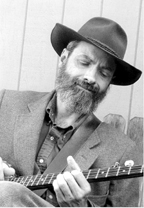Fall 2007, Volume 24.1
Poetry

William Jolliff
William Jolliff, professor of Writing and Literature at George Fox University, grew up on a farm just outside Magnetic Springs, Ohio. His poems, articles, and songs have appeared in Southern Humanities Review, Northwest Review, West Branch, Passages North, Sing Out! and Studies in Short Fiction, among others. His song "Laughlin Boy," as recorded by Tracy Grammer, was among the most widely played songs on American folk radio in 2005.
Cleaning the Watergap
Low buzzards flapped like weary flags,
and I half-knew what we’d find.
Shouldering our tools—
hay-hooks lashed to hoe handles—
we mucked through bottomland on Bokes Creek
all the way to the watergap—a single wire
that marked our property line across water.
May floods had washed trash downstream
from Byhalia and Richwood,
and Uncle Walt said we had a choice:
clean the gap or lose it, and maybe a steer, too.
We fought the current to rip out brush,
and to find what our noses and the buzzards
had already discovered: a Holstein calf,
its eyes open but stony white,
a month old maybe, and a week dead,
bloated and floating like a river buoy,
its throat curled in a U around the wire.
"Well," my cousin Kilby says, "we don’t know
where we came from, and we sure’s hell
don’t know where we’ll go when we die.
And neither did he."
He ripped the calf’s taut neck with his hook,
then pushed the carcass downstream.
And the Worst of It
Good years, my father’s corn would tangle
in the telephone wires. So who cares about
a lawn? He’d get so busy makin’ a livin’
each spring, that he’d let the yard go to prairie.
For months. No more pathetic job in the world,
he claimed, than mowin’ your own grass.
Worse comes to worse, we’ll bale it or
(winking at my mother) borrow a goat.
She said she had a goat. Come July 4th,
he’d hitch the bush hog to a John Deere
and swipe through the tangle, so the cousins
could come for a picnic. He hated picnics.
His first heart attack called at 53,
and its relations followed every two years.
At sixty he quit life at the farm, moved
Mom and himself to a white brick house
near town with three acres of flowers and grass.
He planted trotting horses in the pasture,
bought one of those tractor mowers, and never
bucked another bale or turned a wrench.
Well, I reckon I’m just done, he said.
One April afternoon, nearly corn-planting time,
his heart gave out. His mower ran into the ditch,
and he died there in the yard by the highway.
At Rest in My Father’s House
Before the window, in a soft brown room
above the sun-porch, my boy-mind slept.
The house faced east toward Fulton Creek,
and each day faded easily to black,
alive with the winy dark of summer.
That was easy sleep, at rest in my father’s house,
so gentle an embrace, so loose.
I mistook his easy grace for disconcern,
his hold so still, as sure as his feet
upon the earth, a love as ignorant as gravity.
That was my last real rest, in that dark
comfort of a silent, calloused love
that would not bear a fool, where night
was drawn away from my thrice-patched comforter,
and dawn came bright and pale as an open palm.
